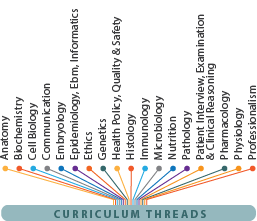
Oregon and OHSU are at the center of the evolution underway in health care. Our state leaders are implementing health care reform at a scale that may prove to be a model for the nation.
OHSU faculty, staff and students are partnering with the state on many innovative initiatives, as well as leading our own. This dynamic evolutionary environment provides unique learning opportunities for students.
This spirit of innovation and evolution is a driving force behind our YOUR M.D. curriculum.
The goal of the School of Medicine curriculum is to balance emphasis on the scientific basis of medicine with early clinical experience; offer progressive patient care responsibilities for students; and permit students to individualize their educational programs as well as to enhance their independent learning and problem solving skills. The sciences basic to medicine are presented in an interdisciplinary format focusing initially on the scientific principles of medicine and ultimately progressing to disease processes and the clinical management and care of patients.
Embracing innovative teaching methods, our curriculum emphasizes the development of knowledge, skills, and behaviors most needed by 21st-century physicians, including interprofessional teamwork and communication, data interpretation, use of information technology and quality science.

Threads
OHSU SoM identified threads that remain prominent and interwoven throughout the whole curriculum.
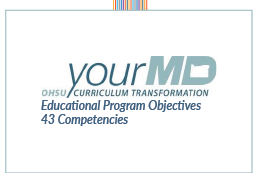
Program Objectives
OHSU School of Medicine MD Program has identified 43 competencies relating to skills, knowledge and abilities that all students must demonstrate proficiency in prior to graduation.
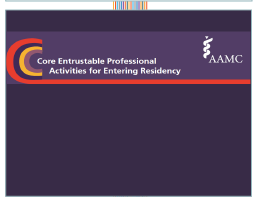
Core Entrustable Professional Activities (EPAs) for entering residency
The AAMC published new guidelines that include 13 activities that all medical students should be able to perform upon entering residency, regardless of their future career specialty. Students will have opportunities to perform and be assessed throughout the curriculum. Prior to graduation, students will be expected to reach the passing threshold for each EPA.
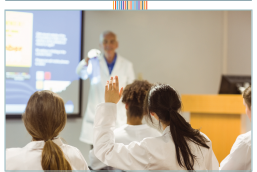
Foundations of Medicine (FoM) Phase
The FoM curriculum phase begins with Transition to Medical School course, followed by 7 required courses which encompasses health system science, clinical skills and basic science content. Each course is followed by an enrichment week where students can individualize their learning opportunities. In addition, students will be co-enrolled in preceptorship/narrative medicine, intro to scholarly project, structural competency series, and IPE.

Clinical Experience Phase
Clinical Experience Curriculum phase begins with Transition to Clinical Experience course. During this phase, to name a few, students complete required clinical experiences, intersessions, scholarly project coursework, testing, clinical/non-clinical electives. Students will rotate at OHSU/VA as well as community and regional sites.
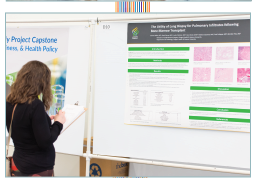
Scholarly Projects
Scholarly Projects is an in-depth investigation of topics of interest to medical students with the goal of creating critical thinkers and lifelong learners.
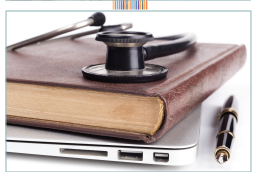
Narrative Medicine
Narrative medicine provides an opportunity to look beyond a disease and consider what it means to be human in medicine.
The OHSU SoM Undergraduate Medical Education (UME) competencies outlined in the linked document are aligned with local and national perspectives for competency-based education. Each of the 43 numbered competencies listed herein is categorized under one of six Domains of Competence (DOC).
This is consistent with the Accreditation Council of Graduate Medical Education (ACGME) competency nomenclature for residency education and because of the continuum of medical education from UME to GME, and from GME to continuing professional development and lifelong learning. Medical students at OHSU will obtain the M.D. degree once all M.D. program graduation requirements have been met. This includes, but is not limited to, achieving designated milestones associated with each competency below as evidenced by robust, multi-modal competency-based assessments in classroom settings, as well as in both simulated and authentic (actual) clinical environments.
The AAMC published new guidelines that include 13 activities that all medical students should be able to perform upon entering residency, regardless of their future career specialty. The guidelines are based on emerging literature documenting a performance gap at the transition point between medical school and residency training.
Transition to Medical School is a 1 week orientation that will help you prepare for your upcoming journey to becoming a physician. The program includes information and learning about the matriculation process as well as an introduction to your classmates, the faculty, coursework and general expectations. You will have opportunities to meet members of the second-year medical student class as well as participate in an interprofessional orientation activity with students in the Schools of Nursing, Dentistry, Pharmacy, and other School of Medicine students in the Physician’s Assistant Program, among others. The School of Medicine White Coat Ceremony will conclude the activities where you will be honored in a ceremony, and provided your first white coat symbolizing your transition into the profession of medicine. You will obtain certification in Basic Life Support, as well as gain access to the electronic health record, EPIC. The course is required prior to entering the Fundamentals Block of the Foundations of Medicine curriculum.
The primary goal is to establish a core knowledge base in biomedical and clinical sciences that students will build upon in subsequent blocks. Upon completing this block students will understand and apply the basic concepts of anatomy, biochemistry, cell biology, embryology, genetics, histology, microbiology, and pharmacology in the context of health and disease. In addition, students will learn about professionalism, ethics, communication, epidemiology, biostatistics, principles of evidence-based medicine, informatics, health policy, patient interviewing and physical examination.
Students who complete this block will recognize the normal blood and immune system structure and function. They will learn about important diseases of blood and immunity including their pathogeneses, presentation, diagnostic tests and management. Students will understand and apply principles of professionalism, ethics, communication, epidemiology, bio statistics, informatics, health policy, patient interviewing and physical examination in relation to the hematologic and immunologic systems.
Students who complete this block will know the structure and function of the musculoskeletal system and use that knowledge to perform a musculoskeletal examination. They will understand the approach to a patient with joint pain or rash, as well as the differential diagnosis, significance and usefulness of diagnostic tests and management strategies for these disorders. Students will understand the mechanisms underlying common musculoskeletal, skin and rheumatologic diseases. Students will apply principles of professionalism, ethics, communication, epidemiology, bio statistics, informatics, health policy, patient interviewing and physical examination in relation to the musculoskeletal, dermatologic and rheumatologic systems.
Students who complete this block will understand the structure and function of the cardiovascular, renal and pulmonary systems in health and disease, not only as individual organ systems but as they integrate in specific physiological and pathophysiological states. Students will learn to collect and interpret clinical data, and relate specific changes in these data parameters to physiological changes, which will guide the choice of therapeutic interventions. They will understand and apply principles of professionalism, ethics, communication, epidemiology, bio statistics, informatics, health policy, patient interviewing and physical examination in relation to the lung, heart and kidney organ systems, in a way that promotes the imprinting of knowledge and the curiosity to keep updating it. It is expected that during their clinical experiences and as graduate physicians the participants will have a solid knowledge base on which to continue perfecting their skills, becoming lifelong learners, who approach and treat their patients’ ailments in an efficient yet compassionate and scientifically sound manner.
Students who complete this block will understand the structure and function of the gastrointestinal tract and the endocrine organs, with emphasis on nutrient acquisition, regulation, and interactions with endogenous regulatory molecules and microorganisms. They will know the clinical presentation of common gastrointestinal and endocrine diseases, and strategies for their management. Students will also understand and apply principles of professionalism, ethics, communication, epidemiology, bio statistics, informatics, health policy, patient interviewing and physical examination in relation to the gastrointestinal and endocrine systems.
Students who complete this block will have a basic understanding of the structural and biochemical foundations of neural functioning in the context of neurophysiology and neuropathology. They will identify the genetic, congenital, developmental, endogenous, and exogenous factors that influence neurologic and behavioral function. They will learn the clinical presentation, diagnostic strategy, and management of common disorders of nervous and sensory systems. Students will also apply principles of professionalism, ethics, communication, epidemiology, biostatistics, informatics, health policy, patient interviewing and physical examination in relation to neuroscience, psychiatric conditions, and the senses.
Students who complete this block will learn an overview of the life cycle from conception through pregnancy, childbirth, infancy, adolescence, adulthood, aging, and death. They will explore sexuality, male and female reproductive health, wellness, and reproductive pathology as well as, the presentation, clinical evaluation and management of common diseases of children and the elderly. Students will learn principles of palliative care and end of life care. Additionally, they will understand and apply principles of professionalism, ethics, communication, epidemiology, biostatistics, informatics, health policy, patient interviewing and physical examination in relation to the developing human and reproduction.
Preceptorship is the first clinical experience for medical students. Students who complete the preceptorship will understand and apply the basic concepts of professionalism, interpersonal and communication skills, system based practice and practice based learning and improvement. Students will also learn the basic concepts and skills of reflective practice. The overall goal is to develop proficiency in the core competencies in order to excel in the clinical clerkships.
This 1 credit course is designed for early health care learners from all OHSU schools and programs (medicine, dentistry, physician assistant, pharmacy, medical physics, nutrition/dietetics, radiation therapy, medical laboratory science, paramedic, accelerated baccalaureate nursing, 3-year nursing students, and graduate nursing programs - adult geriatric acute care nurse practitioner, nurse midwifery, psychiatric mental health nurse practitioner, nurse anesthesia, nurse educator, family nurse practitioner - to introduce them to the importance of best practices for professionalism, roles and responsibilities, teamwork, communication, ethics, and collaborative practices as a means to improve the quality and safety of patient care.
The purpose of the Transition to Clinical Experiences course is to prepare post-Foundational students for their expanded clinical role. Students will learn the necessary skills, behaviors and attitudes to make the transition from the classroom to a healthcare environment. Students who complete this course will be adequately prepared to work on interprofessional teams as well as care for and learn from patients.
The purpose of the Family Medicine Core Clinical Experience is to provide students with a thorough, in-depth and personalized understanding of the specialty of Family Medicine. Through tailored educational activities, students will experience each of the five domains of Family Medicine: Access to Care, Continuity of Care, Comprehensiveness of Care, Coordination of Care and Contextual Care.
In the Internal Medicine Core Clinical Experience, students will develop critical knowledge and skills pertinent to inpatient care of the adult patient. They will learn to navigate complex EMRs to obtain accurate and focused data, obtain hypothesis-driven histories, and perform problem-focused exams. They will formulate an overall assessment, prioritized problem list, and triaged differential diagnosis with a focus on common and/or dangerous conditions.
They will communicate their findings, assessment, plan and reasoning both orally and in writing. Students will follow the patients through until discharge (or rotation off service) and will gain an appreciation for the complexity and risks of transitions of care. They will do this in a clinical environment that is diverse but also rich in “common” medical conditions such as pneumonia, COPD, heart failure, decompensated liver failure, pancreatitis, sepsis, and malignancies and their complications. They will develop structured approaches to common inpatient complaints such as abdominal pain, chest pain, acute and progressive dyspnea, fever, failure to thrive and syncope.
The purpose of the Neurology Core Clinical Experience is for students to learn the principles and skills underlying the recognition and management of the neurologic diseases that a general medical practitioner is most likely to encounter in practice. These include acute and chronic diseases of the brain, spinal cord, peripheral nervous system and muscles. Students will be able to perform a neurological history and examination across the developmental spectrum to create an ordered differential diagnosis and initial treatment plan. This includes the ability to interpret common neurological diagnostic testing, and apply basic neuroscience principles as they care for patients. Students will understand the role of a consultant in the care of patients with neurological disease in both inpatient and outpatient settings.
The purpose of the Obstetrics and Gynecology (OBGYN) Core Clinical Experience is for students to learn the principles and skills underlying the diagnosis and management of major obstetric and gynecologic conditions. This includes learning to perform an OBG history and physical examination (including the pelvic exam), interpret fetal heart rate tracings, participate in the antepartum, intrapartum, and postpartum care of women, and participate in the surgical management of benign and oncologic gynecologic conditions. Students will develop an understanding of the unique issues involved in women’s health care in both inpatient and outpatient care settings.
The purpose of the Pediatric Core Clinical Experience is for students to learn the basics of history-taking, perform age-appropriate physical exams, and develop assessments and plans for infants, children and adolescents. Students will develop an understanding of the unique healthcare needs of pediatric patients, work to identify age-specific milestones, and gain exposure to the basic management of children with special healthcare needs. Students will be exposed to both general and specialty pediatric patients in inpatient and outpatient settings.
The purpose of the Psychiatry Core Clinical Experience is to enable students entering any field of medicine to perform a thorough mental status evaluation, learn the basics of psychiatric disease and psychopathology, utilize appropriate psychopharmacology and perform a psychiatric risk assessment. Students will participate in the management of complex psychiatric patients. Students will work effectively within a multidisciplinary team, demonstrate appropriate management of boundaries with psychiatric patients and demonstrate professionalism in their interactions with patients, colleagues and staff. Students may see patients in both inpatient and outpatient settings.
The purpose of the Surgery Core Clinical Experience is for students to learn the principles of operative and perioperative management of surgical patients and to learn to recognize an acutely ill or injured patient. Students will be able to perform a surgical history and physical examination, and create an ordered differential diagnosis and initial treatment plan. Students will learn the basic principles of wound healing and management of chronic wounds as well as a basic introduction to primary palliative care in the surgical patient. Students will participate in the care of patients in inpatient and outpatient setting, including the operating room where they will be able to demonstrate proper suturing, knot tying and introductory laparoscopic techniques.
The Rural Rotation can be fulfilled with either a core or elective clinical experience depending on the clinical experience offered. It is a minimum of four full-time weeks in duration (or equivalent effort over a longer duration if experience is not full-time). Clinical experience is located in a rural Oregon community, as defined by the State of Oregon Office of Rural Health: “A geographic area in Oregon that is located 10 or more miles from the centroid of a population center of 40,000 people or more.” Clinical experience can be offered in any clinical discipline, or be focused on community-based aspects of the physician’s role in a rural community, such as health policy/advocacy, structural competency, and reducing health disparities
The Continuity Clinical Experience can be fulfilled with either a core or elective clinical experience depending on the clinical experience offered. It is a minimum of eight full-time weeks in duration (or equivalent effort over a longer duration if experience is not full-time). The only exception to the eight full-time week duration is if a student takes a seven full-time week continuity clinical experience during winter term. It can be offered in any clinical discipline and can include more than one discipline
This experience must allow students to maintain continuity in at least two of the following three ways:
Students may request to fulfill the Continuity Clinical Experience requirement with an “away” rotation or a special elective, and these requests must be approved by the Associate Dean for Undergraduate Medical Education. For all special electives, additional approvals from the Department (Faculty Director and Coordinator) must be obtained.
The Clinical Performance Examination (CPX) is a required summative assessment of clinical and professional skills. The CPX consists of cases that mirror common problems students should be prepared to identify and manage following completion of their core clinical experiences. Following the assessment, students will receive feedback on their performance.
Cancer Intersession:
Students who complete this intersession will be able to integrate basic and clinical science knowledge and principles of health care delivery related to cancer and oncology. Students will begin by reviewing cases presented during the Foundation blocks, and any relevant cases encountered during their clinical experiences. In didactic sessions and small groups, they will examine recent literature to understand the mechanisms underlying development of cancer and its progression, including those mechanisms associated with cancer treatment and prevention. Several types of cancer will be explored, discussed and compared. Students will participate in a variety of activities in the OHSU clinical and scientific enterprise to support the application of knowledge to the delivery of health care for patients. Students will also build on the reflective practice and narrative medicine skills learned in the Foundations of Medicine curriculum. This intersession will emphasize key basic science concepts of cancer and may build on some or all of the following threads: anatomy, embryology, histology, cell biology, genetics, biochemistry, nutrition, physiology, pathology, pharmacology, microbiology and immunology — as well as communication, ethics, professionalism, epidemiology, bio statistics, informatics, evidence-based medicine, and health policy, quality and safety that were introduced during the Foundation of Medicine blocks.
Cognitive Impairment Intersession:
Students who complete this intersession will be able to integrate basic and clinical science knowledge and principles of health care delivery related to cognitive impairment. Students will begin by reviewing cases presented during the Foundation blocks, any relevant cases encountered during their clinical experiences, and other cases developed for this course. In didactic sessions and small groups, they will examine recent literature to understand the neuropathological mechanisms underlying development of cognitive impairment across the lifespan. Methods and tools to assess the degree of impairment and prognosis for recovery will be discussed. Impairments associated with different cognitive functions (e.g., memory, attention), will be explored, discussed and compared. Students will participate in a variety of activities in the OHSU clinical and scientific enterprise to support the application of knowledge to the delivery of health care for patients. This intersession will emphasize key basic science concepts of neural functioning and may build on some or all of the following threads: anatomy, embryology, histology, cell biology, genetics, biochemistry, nutrition, physiology, pathology, pharmacology, microbiology and immunology — as well as communication, ethics, professionalism, epidemiology, bio statistics, informatics, evidence-based medicine, and health policy, quality and safety that were introduced during the Foundation of Medicine blocks.
Infection Intersession:
Students who complete this intersession will be able to integrate basic and clinical science knowledge and principles of health care delivery related to healthcare associated infections. Students will begin by reviewing cases presented during the Foundation blocks, any relevant cases encountered during their clinical experiences, and other cases developed for this course. In didactic sessions and small groups, they will examine recent literature to understand the mechanisms underlying bacterial resistance, the human microbiome, and the response to infections by public health officials. Several types of infection scenarios will be explored, discussed and compared. Students will participate in a variety of activities in the OHSU clinical and scientific enterprise, as well as in the OHSU Simulation Center, to support the application of knowledge to the delivery of health care for patients. Group projects will allow students to actively explore a variety of issues related to infections in an in-depth manner using basic, clinical, and healthcare delivery sciences as the framework. This intersession will emphasize key basic science concepts of infections, and may build on some or all of the following threads: anatomy, embryology, histology, cell biology, genetics, biochemistry, nutrition, physiology, pathology, pharmacology, microbiology and immunology — as well as communication, ethics, professionalism, epidemiology, bio statistics, informatics, evidence-based medicine, and health policy, quality and safety that were introduced during the Foundation of Medicine blocks
Pain Intersession:
Students who complete this intersession will be able to integrate basic and clinical science knowledge and principles of health systems science related to pain and addiction. Students will begin by reviewing cases presented during the Foundation blocks, any relevant cases encountered during their clinical experiences, and other cases developed for this course. In didactic sessions and small groups, they will examine recent literature to understand the biological mechanisms underlying pain including those associated with treatment. Several non-pharmacologic approaches to pain management will be explored, discussed and compared, as well as public health and health policy implications of pain management. Students will participate in a variety of activities in the OHSU clinical and scientific enterprise to support the application of knowledge to the delivery of health care for patients. Group projects will allow students to actively explore a variety of issues related to pain and addiction in an in-depth manner using basic, clinical, and healthcare delivery sciences as the framework. This intersession will emphasize key basic science concepts of pain and addiction, and may build on some or all of the following threads: anatomy, embryology, histology, cell biology, genetics, biochemistry, nutrition, physiology, pathology, pharmacology, microbiology and immunology — as well as communication, ethics, professionalism, epidemiology, bio statistics, informatics, evidence-based medicine, and health policy, quality and safety that were introduced during the Foundation of Medicine blocks.
Dissection of Coronavirus Intersession:
Students who complete this Intersession will not only be able to integrate basic and clinical science knowledge and principles of health systems related to the COVID 19 pandemic, but also integrate key epidemiology, ethics, and health disparities applications. In didactic sessions (virtual/voice-over online presentations), they will examine recent literature to understand the mechanisms underlying virus characteristics, mode of transmission, coronavirus pathophysiology, tools for prevention and treatment, and the response to the pandemic, as well as the socioeconomic and mental health aspect of the disease. Several types of infection scenarios will be explored, discussed, and compared. Students will participate in a variety of activities to support the application of knowledge to the delivery of health care for patients. Group projects will allow students to actively explore issues related toCOVID-19 in an in-depth manner, using basic, clinical, and health systems sciences, as well as epidemiology as the framework. This Intersession will emphasize key basic science concepts of the coronavirus infections and may build on some or all of the following threads: anatomy, embryology, histology, cell biology, genetics, biochemistry, nutrition, physiology, pathology, pharmacology, microbiology, and immunology, and well as communication, ethics, professionalism, epidemiology, bio statistics, informatics, evidence-based medicine, reflective practice, narrative medicine, and health policy, quality and safety, that were introduced during the FoM blocks.
(Dis)ability Intersession:
Nearly every single patient presents to our clinics and hospitals with an acute or chronic experience of disability. While most often, clinical management of disease is focused on the explicit aim of reduction or elimination of disability, limited time is spent exploring the assumptions and consequences of this aim. In this course, students will explore our cultural understanding of disability within medicine, map out the outcomes of disease (biological or functional difference) in the context of the societies in which we live, and learn how to engage with disability justice as healthcare professionals. This course will equip students with the knowledge and practical skills to meet the needs of all our patients, inclusive of patients with intersectional identities who experience disability, chronic illness, and neurodivergence. Course goals have been adapted from the Alliance for Disability in Health Care Education’s Disability Core Competencies. This course has been co-created by current and past students and faculty with disabilities at OHSU. It is grounded in the principles of disability justice established by Sins Invalid.
Testing intersessions are typically one-week courses in the Clinical Experience phase of the YourMD curriculum that allow students to study for and take a national exam from the Clinical Experiences phase of YourMD (e.g., NBME subject “shelf” exam in the core content areas of Family Medicine, Internal Medicine, Neurology, Obstetrics/Gynecology, Pediatrics, Psychiatry, and Surgery.)
A minimum of 34 elective credits must be taken and passed. A maximum of four credits of non-clinical electives taken during the Foundations of Medicine curriculum may be used to meet graduation requirements for electives. A minimum of 22 credits must be clinical experience electives. These may include clinical experiences taken at OHSU or one of the OHSU regional sites, an “away” rotation, or an international clinical experience. Remaining credits in this category may be fulfilled with either clinical or non-clinical electives, and/or scholarly project work of the student’s choice during the Clinical Experience curriculum
Transition to Residency is taken during the final year of medical school in order to prepare students for transitioning into residency programs as physicians. The course includes didactic and small group sessions, as well as active-learning instruction and activities around five general themes:
1. Communicating with patients and families
2. Understanding and applying essential non-clinical aspects of medical practice
3. Practicing and reviewing basic clinical skills
4. Recognizing and articulating the principles of overdiagnosis, and
5. Basic preparedness for residency.
Passing the course is required prior to graduation from OHSU School of Medicine’s Undergraduate Medical Education program.
Scholarly Projects is an in-depth investigation of topics of interest to medical students during the course of their undergraduate medical education (UME) 14 experiences with the goal of creating critical thinkers and lifelong learners.
Students who complete Scholarly Projects will be able to:
Students will also understand and apply principles of professionalism, ethics, communication and collaboration, while pursuing their projects.
Reflective Practice: Students learn and develop skills in reflective practice by writing Field Notes during Foundations of Medicine and clinical experiences. Field Notes are written responses to writing prompts, designed to provoke deeper reflection into the multitude of experiences students have in their professional development as physicians. Narrative feedback is provided by trained faculty readers. Students read and discuss Field Notes in Peer Reflection sessions. Upper level students are invited to be “Student Champions,” to lead small group sessions of their peers and junior level students.
Narrative Medicine: Narrative medicine is care practiced with narrative competence—the ability to listen, absorb, and be moved to action by the stories of illness. During Intersessions and selected elective experiences students use non-medical texts, visual art, graphic medicine, or film to consider the experience of illness from multiple perspectives. Narrative medicine provides an opportunity to look beyond a disease and consider what it means to be human in medicine.
Oregon Health & Science University is dedicated to improving the health and quality of life for all Oregonians through excellence, innovation and leadership in health care, education and research.
© 2001-2024 Oregon Health & Science University. OHSU is an equal opportunity affirmative action institution.